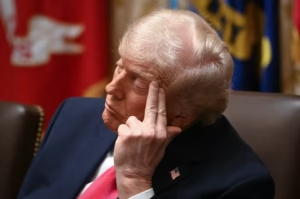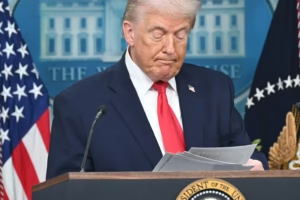In a bold move that has reverberated through diplomatic circles, Bridget Brink, the former U.S. Ambassador to Ukraine, publicly resigned in April 2025, citing deep disagreements with President Donald Trump’s approach to the Ukraine-Russia conflict. Brink’s resignation underscores a growing concern among foreign policy experts about the direction of U.S. engagement in Eastern Europe.
1. Bridget Brink’s Resignation: A Principled Stand
Bridget Brink, a seasoned diplomat with over three decades of service under both Republican and Democratic administrations, took the unprecedented step of resigning from her post as U.S. Ambassador to Ukraine. In an op-ed published in the Detroit Free Press, Brink articulated her reasons, stating, “I cannot stand by while a country is invaded, a democracy bombarded, and children killed with impunity.”
Brink’s decision was not made lightly. She emphasized that her resignation was a matter of principle, driven by the Trump administration’s policy shift, which she perceived as placing undue pressure on Ukraine, the victim of aggression, rather than confronting Russia, the aggressor. This stance marked a significant departure from her previous unwavering support for Ukraine during her tenure.
2. Trump’s Foreign Policy Shift: Appeasement or Strategy?
Since returning to office in January 2025, President Trump has advocated for a swift resolution to the Ukraine conflict, often expressing a desire to negotiate directly with Russian President Vladimir Putin. Critics argue that this approach amounts to appeasement, potentially compromising Ukraine’s sovereignty and emboldening Russian aggression.
Brink’s resignation highlights the internal dissent within the U.S. diplomatic corps regarding this policy direction. Her departure signals a broader concern that the administration’s strategy may undermine long-standing U.S. commitments to democratic allies and the principles of international law.
3. International Repercussions and Diplomatic Strain
Brink’s resignation has not only stirred domestic debate but also raised eyebrows among international partners. European allies, in particular, have expressed unease over the perceived shift in U.S. policy. Former French President François Hollande remarked that the Trump administration’s stance could signal a “divorce” between Europe and the United States.
The concern is that a U.S. retreat from its traditional role as a defender of democratic values could embolden autocratic regimes and destabilize the existing international order. Brink’s resignation serves as a stark reminder of the potential consequences of such a policy shift.
4. The Human Cost: Ukraine’s Ongoing Struggle
The conflict in Ukraine has exacted a heavy toll on its civilian population. Brink’s resignation letter highlighted the humanitarian crisis, noting the deaths of 700 children and the abduction of 20,000 individuals. These figures underscore the urgency of a robust international response to Russian aggression. (The Times)
Brink’s departure draws attention to the moral imperative of supporting Ukraine in its fight for sovereignty and democracy. Her resignation serves as a call to action for the international community to reaffirm its commitment to upholding human rights and international law.
5. A Call for Renewed Commitment to Democratic Values
Bridget Brink’s resignation is more than a personal decision; it is a clarion call for the United States to reassess its foreign policy priorities. Her principled stand emphasizes the importance of aligning U.S. actions with its professed values of supporting democracy and opposing authoritarianism.
As the situation in Ukraine continues to evolve, Brink’s resignation serves as a poignant reminder of the stakes involved and the need for steadfast commitment to democratic principles. Her actions challenge policymakers and citizens alike to consider the moral dimensions of foreign policy decisions.
Conclusion
Bridget Brink’s resignation from her role as U.S. Ambassador to Ukraine marks a significant moment in contemporary diplomacy. Her decision, rooted in a deep commitment to democratic values and opposition to authoritarian aggression, challenges the current trajectory of U.S. foreign policy under President Trump. As the international community grapples with the complexities of the Ukraine conflict, Brink’s stand serves as both a warning and a beacon, urging a return to principled leadership and unwavering support for democratic allies.
Subscribe to trusted news sites like USnewsSphere.com for continuous updates.
[USnewsSphere.com / reu]





